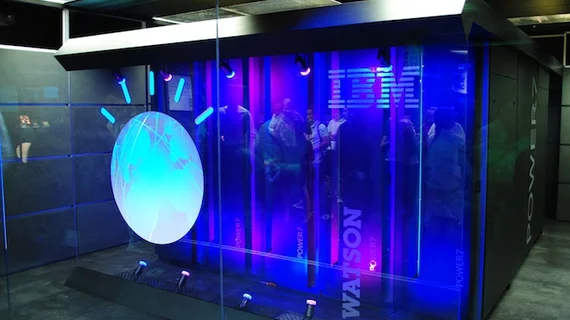Several healthcare startups named as finalists for IBM Watson's AI competition
Thirty teams are advancing in IBM Watson’s international AI competition, with healthcare startups making up more than half of the top 10 finalists.
IBM Watson announced the top 30 teams advancing in its AI XPrize competition. The global competition asks teams to create their own AI technologies to solve “grand” challenges humanity faces. The competition aims to “accelerate the adoption of AI technologies and spark creative, innovative and audacious demonstrations of the technology that are truly scalable to solve societal grand challenges,” IBM’s website dedicated to the competition statement. It also comes with a $5 million prize.
The top 30 teams advancing in the competition were chosen from a field 62 teams by an independent panel of expert judges. Of that group, IBM Watson announced its top 10 teams for the competition, with more than half of them being healthcare-based.
The top 10 teams were:
- aifred health, which is developing a system that uses high-quality data about mental health to help physicians work with their patients to choose personalized treatments for depression.
- Amiko AI, which is developing a system that enables real-time monitoring of medication use and patient health to assist healthcare professionals and empower asthma patients to achieve better outcomes
- Behaivior, which is developing a platform which will combine data from wearables and smartphones into an early warning system to predict and prevent addiction relapses and overdoses, with an initial focus on opioids.
- Choosito!, which is creating smart search engine tool powered by artificial intelligence that automates how people index, analyze, search and deliver personalized digital content.
- Deep Drug, which is developing a drug design software that learns from the successes and failures of previous clinical trials to shorten the developmental timeline of new drugs.
- emPrize, which is developing virtual tutors for online education that will offer learning assistance through personalized tutoring, answering questions and providing feedback to students.
- InnoVie Health, which is aimed at helping resource-strained hospitals optimize their services to give better quality care.
- Machine Genes, which is using evolutionary machine learning and advanced AI to recommend the best insulin dosage and keep each individual diabetes patient’s blood glucose levels under control with unprecedented stability and safety.
- Nectar, which is using analytics to help beekeepers be better at their jobs while also minimizing the loss of colonies.
- Zzapp Malaria, which is applying AI in the fight against malaria, by analyzing online databases and satellite data to create intervention strategies for individual communities based on environmental and other conditions.
“This competition has made it evident that the teams’ efforts to apply AI for Good not only started the trend, but created a global movement,” Amir Banifatemi, general manager for Innovation and Growth at XPrize, said in a prepared statement. “We’re proud to see humans rallying together to build responsible and useful AI that will solve some of the grandest challenges of our time.”
The top 10 teams will get to compete for additional prizes later this month. For those still interested in signing up for the competition, IBM Watson is holding a second wildcard registration, which is open until Dec. 14, 2018.

